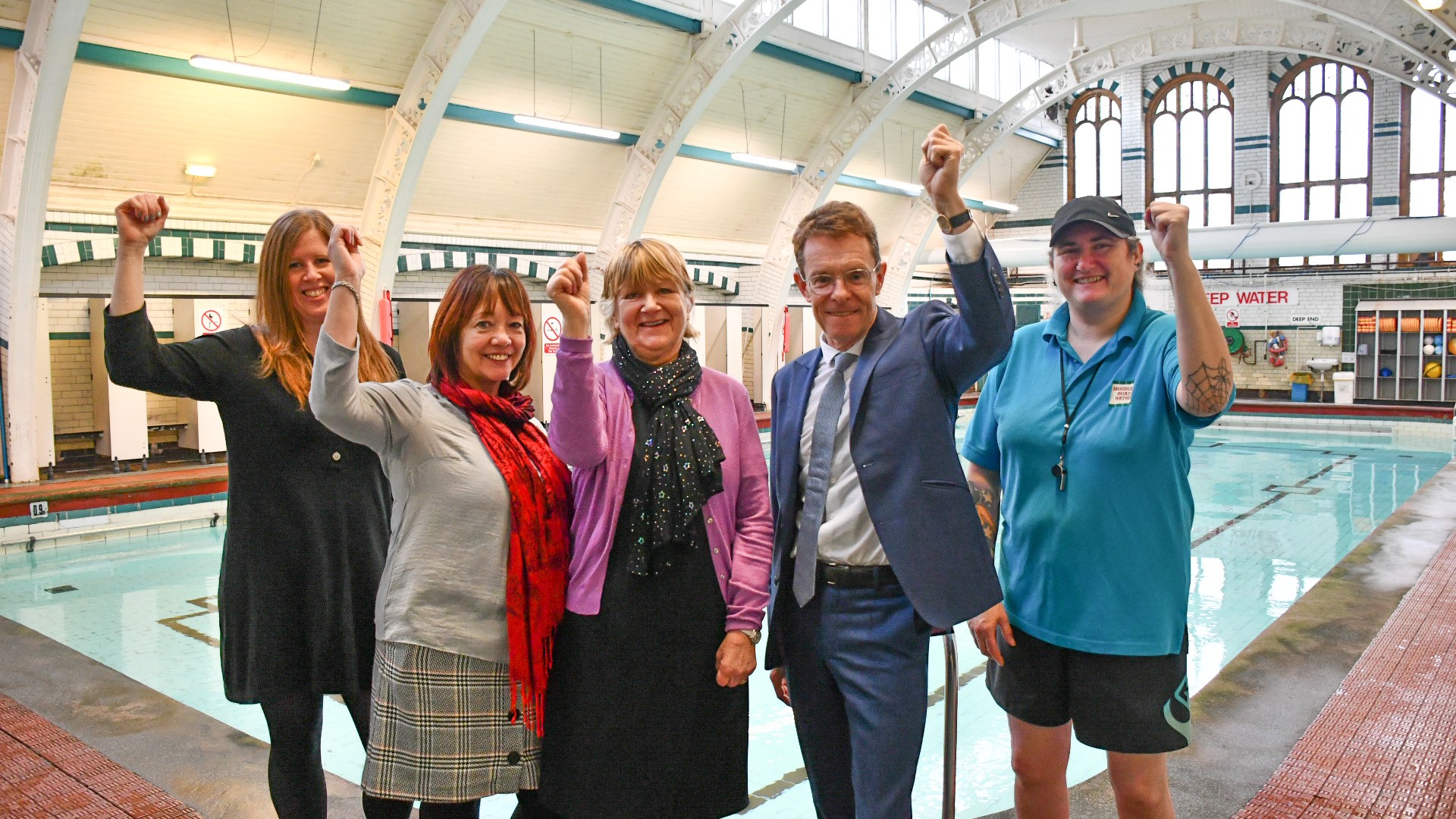Mayor calls on businesses to boost social enterprises
Published: Thursday 09 Jan 2020
Mayor of the West Midlands Andy Street has urged businesses to help improve people's lives by supporting local social enterprises.
The Mayor visited Moseley Road Baths in Balsall Heath - a much-loved community building saved from closure by a social enterprise - during the launch of the region's Social Economy Taskforce report at the nearby Moseley Community Hub.
Social enterprises are businesses, not-for-profit organisations or charities that reinvest their profits in their social mission.

L-R Kat Pearson, trustee at Moseley Road Baths CIO, Carole Donnelly and Gillian Morbey, co-chairs of the Social Economy Taskforce, Mayor of the West Midlands Andy Street and Viv Harrison, general manager of Moseley Road Baths
The social economy in the West Midlands is thought to be worth £3.5 billion* and the West Midlands Combined Authority (WMCA) is aiming to double that figure over the next decade.
The Mayor, a former managing director of employee-owned John Lewis, the largest social enterprise in the country, said: Moseley Road Baths is a perfect example of how social enterprises are helping local communities to thrive.
From my experience at John Lewis, which prides itself on being Britain's biggest social enterprise, I have seen how the social economy helps people to live happier, more fulfilling lives.
We want to double the size of the social economy in the West Midlands and are calling on local businesses to consider using social enterprises when buying goods or services.
It's crucial that the WMCA leads by example. To date, the authority has secured £2.7 million of social value commitments through the contracts it has awarded.
We have now pledged to spend at least five per cent of our procurement budget on social enterprises, and to build on the brilliant work that our local authority partners, who are represented on the Social Economy Taskforce, are doing in their areas
Moseley Road Baths Charitable Incorporated Organisation (CIO) took over the day-to-day running of the historic Balsall Heath building in 2018 to save it from closure, with the support of Birmingham City Council. Trustees of this social enterprise are members of the local community and regular swimmers at the pool.
The CIO is working in coalition with the Friends of Moseley Road Baths, Historic England, the National Trust and the World Monuments Fund. The focus has been on keeping the pool open for swimming, carrying out conservation-led building works to halt deterioration, and developing a masterplan that will secure the long-term future of the baths.
During the launch the Mayor also heard about other social enterprises in the area, including The Bike Project, which donates refurbished second-hand bikes to refugees, and Sundragon Pottery, which runs courses in pottery for people of all ages and abilities.
Cllr Yvonne Davies, leader of Sandwell Council and WMCA portfolio holder for public service reform and social economy, said: Social enterprises are more likely than other businesses to be based in, and focused on, deprived areas. By boosting the region's social economy, we are delivering inclusive growth.
As well as buying goods and services, there are other ways in which businesses can support social enterprises. They could join each other's boards to build a shared understanding, or businesses could back campaigns and events led by social enterprises
The Social Economy Taskforce has made the following main recommendations for the WMCA and its partners:
- Boost the collective identity of social enterprise by strengthening and growing successful initiatives;
- Develop a collaborative, ten-year business case for social enterprise business support;
- Lead a campaign to encourage closer links between social enterprises and the wider private sector;
- Work with social finance and investment partners to identify improvements that could boost the impact of social investment;
- The WMCA Office of Data and Analytics to develop consistent approach to measuring public sector spending with social enterprise; and
- The WMCA to use its convening role to encourage all regional public sector bodies and publicly funded projects to spend at least five per cent of their commissioning and procurement budget with social enterprise.
The next steps will be for the WMCA to develop a baseline to measure the value of the region's social economy, and then to produce a business plan to achieve the goal of doubling the size of the social economy in the West Midlands over the next ten years.
*Based on research from Social Enterprise UK - https://www.socialenterprise.org.uk/policy-and-research-reports/the-hidden-revolution/
